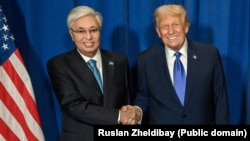
After striking a raft of mineral deals in recent weeks with Australia, Malaysia, Thailand, and Japan, US President Donald Trump will now turn his attention to Central Asia as he hosts the region's leaders in Washington for a high-profile summit on November 6.
The Central Asian states are known for their extensive oil and gas resources, but the region also has largely untapped rich reserves of critical minerals and rare earths -- elements deemed vital to US national security.
Kazakhstan, Kyrgyzstan, Tajikistan, Turkmenistan, and Uzbekistan are expected to look to translate their mineral wealth into stronger ties with the United States as the White House looks to secure new partnerships.
"The Central Asians look well-positioned with their large deposits and growing investment in the Middle Corridor," Joseph Epstein, director of the Washington-based Yorktown Institute's Turan Research Center, told RFE/RL, referring to the emerging 6,500-kilometer-long trade route that connects China to Europe through Central Asia and the Caucasus by bypassing Russia.
The summit comes on the heels of Trump's mineral diplomacy across the Asia-Pacific and the US president's meeting with Chinese leader Xi Jinping amid a trade war fueled in part by Beijing's export restrictions over strategically vital rare earth elements.
China maintains a powerful grip on global supply chains for the elements, commanding more than 70 percent of global rare-earth mining, 90 percent of their separation and processing, and 93 percent of magnet manufacturing.
After Xi agreed to a one-year pause on some of those restrictions following his meeting with Trump, Washington is now looking to work toward breaking China's near monopoly.
Experts say Central Asia is a complementary fit, with the region's governments seeking US investment to counterbalance Chinese and Russian influence and avoid becoming overly dependent on their two neighbors.
"Both Beijing and Washington are set to use the pause to create an advantage from their side to have more leverage in the next round of trade tensions," Epstein said. "That makes the United States even more of a counterweight as the Central Asians look to preserve their multi-vector foreign policies."
What's On The Agenda In Washington?
Few issues have shaped the White House's agenda since Trump returned to office in January more than critical minerals, a group of roughly 50 mineral commodities that the US Geological Survey has deemed critical to the country's national and economic security. Among those commodities are rare earths, 17 elements used in everything from wind turbines to smartphones to fighter jet engines.
"This has the potential to be a new way for Central Asian leaders to improve their domestic economic outlooks and get a rapid influx of foreign direct investment," Eldaniz Gusseinov, head of research at Nightingale Intelligence, a political foresight firm, told RFE/RL.
Beyond the region's mineral wealth, the gathering will also cover energy logistics, infrastructure investments, technology transfer from the United States to the region, educational exchanges, and water-resource management.
The autocratic former Soviet republics of Central Asia have been accused of committing widespread human rights abuses for years. But the issue is not expected to feature prominently, prompting some advocacy groups to voice concerns.
"The Central Asia-US summit should ensure human rights is a key part of the agenda, especially as repression increases across Central Asia," Hugh Williamson, Europe and Central Asia director at Human Rights Watch, said in a statement. "Participating countries should recognize that they risk recent social and economic progress if international partners seek stable environments elsewhere for engagement and investment."
Launched in 2015 with a foreign ministers' summit attended by then-US Secretary of State John Kerry, the C5+1 summit -- the official name for the format grouping the United States with the five Central Asian states -- has been the predominant venue for Washington's high-level engagement with the region.
This year's summit marks only the second time the gathering will take place at the presidential level, and the region is looking to capitalize.
Kazakhstan is expected to press for a pledge from the Trump administration to work with the Republican-controlled Congress to repeal Jackson-Vanik trade restrictions, a Cold War-era law that imposes trade barriers on countries with nonmarket economies that restrict emigration.
Ahead of the summit, the White House is also in talks over access to one of the world's largest untapped deposits of tungsten -- a metal used by the Pentagon to make ammunition, projectiles, and other weaponry -- that is in Kazakhstan.
According to Bloomberg, US Commerce Secretary Howard Lutnick has brokered talks between US company Cove Kaz Capital Group LLC and Kazakhstan's sovereign wealth fund about a bid to develop two massive deposits in the Central Asian country.
What Does Central Asia Want From The Trump Administration?
Central Asian leaders appear to recognize the opportunity before them. Uzbek President Shavkat Mirziyoyev has unveiled plans to develop rare earth metals projects worth $500 million. Kazakh President Qasym-Zhomart Toqaev told parliament this year that rare earths have become the "new oil" and developing them is a "priority task."
But much of the region's deposits remain unexplored and untapped and, in some cases, still rely on geological surveys conducted during the Soviet era.
For instance, Kazakhstan announced in April that it discovered massive deposits of more than 20 million metric tons of rare earths. The claim is still being confirmed by international firms, but if proven it would give the Central Asian country the world's third-largest reserves of rare earth metals, behind only China and Brazil.
William Courtney, a former US ambassador to Kazakhstan and adjunct senior fellow at the Rand Corporation, told RFE/RL that Central Asian governments are looking to expand cooperation with the United States in the surveying, mining, and exporting of rare earths and other critical minerals but are particularly looking for investments into processing them.
In the case of rare earths, China maintains a near monopoly on processing the metals, in part due to steady investment over decades and lax regulations that allow for the high-polluting environmental impact of processing them.
"It's China's monopoly of the processing that is more important than the supply," Courtney told RFE/RL. "So, if you're the United States and you want to compete, you need to find other countries without strict environmental regulations that are willing to host."
Many Central Asian countries have already geared their laws toward attracting mining companies, but bringing in more US investment into the sector will also require lowering barriers for foreign capital to enter the market -- something that is on the agenda at the summit.
That will also tie into another goal for the region's leaders: attracting more investment into logistics routes.
The Middle Corridor, formally known as the Trans Caspian Transport Corridor, would be the main artery to transport the region's mineral wealth.
The route has already attracted investments from Europe, China, and the Arab Gulf countries, and Central Asian leaders are hoping Washington's interest in the region's minerals will draw in additional investment.
"This focus on minerals and processing them also helps justify and build up the Middle Corridor," Gusseinov said.


















